المراقبة والتقييم
لا تتعلق معظم تحديات الرصد والتقييم، مثل الافتقار إلى الاستثمار والقدرات الكافية، تحديدًا بالمساعدات النقدية والقسائم. لكن تلك التي تتعلق في المقام الأول برصد نتائج عمليات النقل غير المقيدة. ويمكن أن تجعل مرونة التحويلات النقدية من الصعب تحديد مؤشرات النتائج المناسبة، لأنها قد تتضمن مجموعة من المؤشرات القطاعية والشاملة. وفي الوقت نفسه، هناك قيود على جمع بيانات دقيقة حول كيفية إنفاق التحويلات النقدية.
التزم الموقعون على الصفقة الكبرى بضمان وجود آليات الرصد والتقييم ذات الصلة فيما يتعلق بالنقد، وزيادة فهم التكاليف والفوائد والآثار والمخاطر المتعلقة بالنقد بالنسبة للطرائق الأخرى. بناءً على ذلك، يحتوي مسار الصفقة الكبرى على نقاط عمل بما في ذلك تطوير مؤشرات نتائج مشتركة للمساعدات النقدية متعددة الأغراض، ومقاييس لتحليل القيمة مقابل المال. تم تقييد التحليل المنهجي للقيمة مقابل المال بسبب عوامل تشمل عدم وجود نهج متفق عليها، والحاجة إلى بيانات نتائج عالية الجودة، وطبيعة التحليل.
الأولويات الحالية
في إطار الالتزامات النقدية للصفقة الكبرى، شاركت شبكة CALP (مع الوكالة الأمريكية للتنمية الدولية وخدمات الإغاثة الكاثوليكية) في تطوير مؤشرات النتائج للمساعدات النقدية متعددة الأغراض. وتُتاح مسودة الاختبار حاليًا باللغات الإنجليزية والفرنسية والإسبانية عبر مكتبة شبكة CALP.
Related initiatives
Featured content

Multipurpose Cash Outcome Indicators – Final Draft for Testing
Guidelines and Tools
Note that the MPC indicators have now been revised. Please click here to access the updated Multipurpose Outcome Indicators and Guidance, which is available in Arabic, English, French and Spanish. Multipurpose Cash Outcome Indicators – Final Draft for Testing Multipurpose cash (MPC) is a type of assistance intended to enable people to meet their basic needs through local...

Monitoring 4 CTP: Monitoring Guidance for CTP in Emergencies
Guidelines and Tools
This guidance provides a central resource to promote a common understanding of the most important monitoring considerations for humanitarian projects using cash transfer programming (CTP). The primary audience for this guidance is field-level practitioners, from organisations directly involved in the design, implementation, monitoring, and accountability of projects using cash and vouchers...

Cost-Efficiency Analysis of Basic Needs Programs: Best Practice Guidance for Humanitarian Agencies
Guidelines and Tools
The Efficiency, Effectiveness and Value for Money Sub-Workstream is pleased to share the final output on Cost-Efficiency Analysis of Basic Needs Programs: Best Practice Guidance for Humanitarian Agencies (attached).
Cost-efficiency analysis estimates the ratio of program costs to outputs created, allowing you to compare cost-per-output for programs which all produced the same output. Such...
Thematic lead
Latest
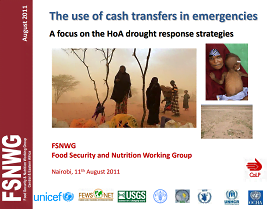
The Use of Cash Transfers in Emergencies: A focus on the HoA response strategies
Presentation
A focus on the HOA drought response strategies
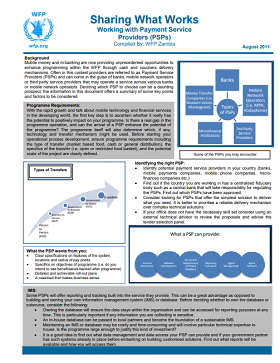
Sharing What Works – Working with payment service providers (PSPs)
Report
A handy tool on choosing payment service providers for delivering cash transfers developed by WFP Zambia. Mobile money and m-banking are now providing unprecedented opportunities to enhance programming within the WFP through cash and vouchers delivery mechanisms. Often in this context providers are...

Evaluation Report Fresh Food Voucher – ACF Santa Cruz, Bolivia
Case Study
This report presents and discusses the results of a pilot study to deliver vouchers, which can be exchanged for fresh foods, to indigenous communities in rural areas of the Bolivian Chaco. This intervention is meant as an emergency measure as a result of the prolonged drought that had endangered the food...

Trading in Turbulent Times: Smallholder maize marketing in the Southern Highlands, Tanzania
Case Study
The short-run effects of the 2007/2008 global food crisis on semi-subsistence farmers’ well-being in low-income countries depends on whether they are net sellers or net buyers of the affected commodities. Realizing that farmers face volatile prices over the course of an agricultural year, this study...

Good Practice Review 11: Cash transfer programming in emergencies
Guidelines and Tools
The GPR is intended for humanitarian practitioners who plan and implement emergency responses – both those who are already familiar with cash-based interventions and those who are not. It synthesises cash transfer guidelines, highlights lessons from evaluations and adds practical examples drawn from...
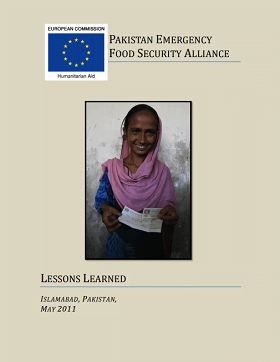
Pakistan Emergency Food Security Alliance: Lessons Learned
Report
In response to the unprecedented scale of flooding that affected Pakistan in July 2010, six INGOs – Save the Children, Oxfam GB, IRC, CARE, ACTED and Action Against Hunger / ACF International – formed the Pakistan Emergency Food Security Alliance (PEFSA). Working together in order to maximize the...
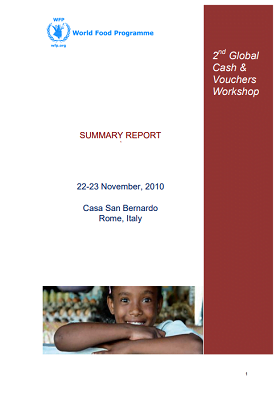
WFP 2nd Global Workshop on Cash and Vouchers
Report
Executive Summary The 2nd Global Cash and Vouchers Workshop in Rome 22-23 November 2010, was convened jointly by the Programme Division (ODX) and the Policy Planning and Strategy Division (OEDP), one year following the 1st Global Cash and Vouchers Workshop convened in Johannesburg 17-19 November 2009. The...
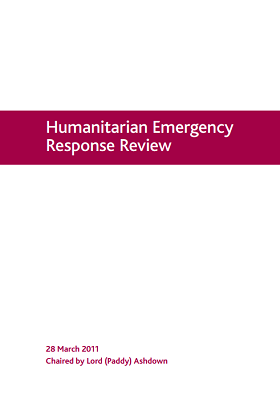
Humanitarian Emergency Response Review
Report
This independent review into how the UK (through DFID) responds to humanitarian emergencies, considers how the UK should best respond to overseas emergencies and the role the UK should play in the international humanitarian system. It looks at the potential future humanitarian challenges and the...

Local and Regional Procurement of Food Aid in Uganda: The Experience of Maize Traders
Report
Local and regional procurement (LRP), the purchase of foods for food assistance in or near an affected region, is growing in importance in the world of food assistance. Food aid has been traditionally “tied,” which is to say contingent on sourcing in donor countries. The political climate in...
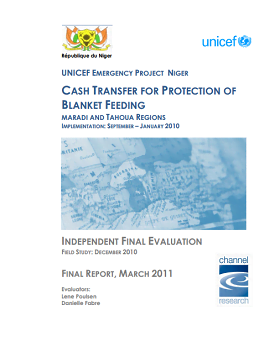
Cash Transfer for Protection of Blanket Feeding: Maradi and Tahoua regions
Report
The Project ‘Cash Transfer to Protect Blanket Feeding’ in Niger was launched by UNICEF in June 2010. The Project was a direct response to the growing evidence that blanket supplementary feeding rations distributed to children of 6 to 23 months of age in food insecure communities were consumed by older...

The CALP Network 4th Global Learning Event: Global innovations and lessons learned from response in South and South-East Asia (Final report)
Report
The 4th CALP Network Global Learning Event was held in Bangkok, Thailand on the 16th and 17th February 2011, hosted by the CALP Network in partnership with the International Federation of the Red Cross and Red Crescent Societies (IFRC). This inter-agency event was designed to present the latest thinking...

The Livestock Emergency Guidelines and Standards (LEGS)
Guidelines and Tools
A presentation giving insight to LEGS, discussing: Aims of LEGS Rationale of LEGS Development of LEGS Objectives and approaches PRIM LEGS training programme. Taken from the Cash Learning Partnership Global Learning Event Bangkok, 16-17 February 2011.
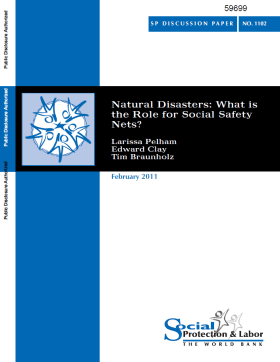
Natural Disasters: What is the role for social safety nets?
Policy paper
This paper makes the case for why safety nets are an important tool for managing the risk of natural hazards. The use of safety nets is advocated both ex ante, to prevent and mitigate the impact of natural disaster and ex post, to cope with the impacts of natural shocks. Firstly, the paper explores the...
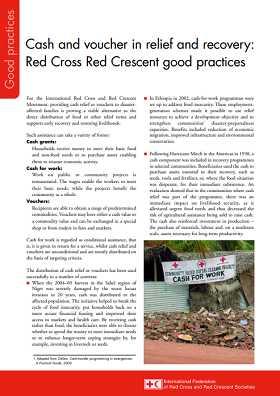
Cash and voucher in relief and recovery: Red Cross Red Crescent good practices
Report
A two-page brief giving some examples of the Red Cross / Red Crescent movement’s experience using cash grants, vouchers, and cash-for-work in emergency response.
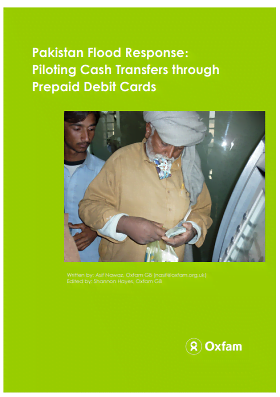
Pakistan Flood Response: Piloting Cash Transfers through Prepaid Debit Cards
Case Study
This case study looks at the pilot study carried out by Oxfam to test the innovative payment method of pre-paid debit cards in Pakistan following the 2010 flood. The objective was to understand the viability and effectiveness of the United Bank Limited’s WIZ pre-paid debit card, as a valid payment...
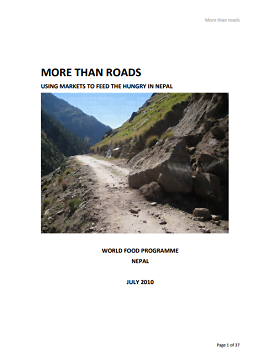
More than roads: Using markets to feed the hungry in Nepal
Report
This report, based on research in Nepal, focuses on the importance of markets and road infrastructure, which could be used to inform longer term food security strategies. The report goes through the basis of the research, the context of the market environment and highlights the services provided and the...
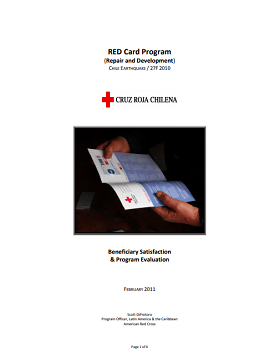
RED Card Program (Repair and Development) Chile Earthquake 2010
Report
On 27 February 2010 an earthquake measuring magnitude 8.8 on the Richter scale struck the Bío-Bío and Maule regions of Chile, at a depth of only 35km. This earthquake was then followed by an equally devastating tsunami. This double disaster left more than 480 people dead, more than 1.8 million people...

Voucher Fairs: A Quick Delivery Guide (booklet version)
Guidelines and Tools
A Quick Delivery Guide to using voucher fairs to implement a market-based emergency response. Prepared as a practical tool, this guide provides a brief synthesis of the necessary preconditions and advantages and disadvantages of using voucher fairs. It also provides practical implementation tips. This...
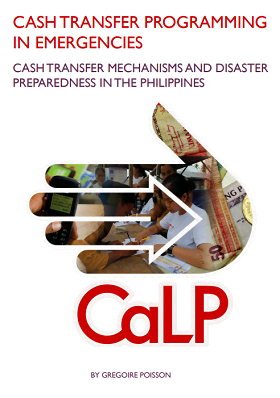
Cash transfer mechanisms and disaster preparedness in the Philippines
Report
The use of cash to deliver assistance in case of humanitarian emergency remains a relatively new approach in the Philippines, and aid agencies are at the early stages of developing guidelines, policies and organizational capacity to implement cash projects. Project managers lack support and guidance with...
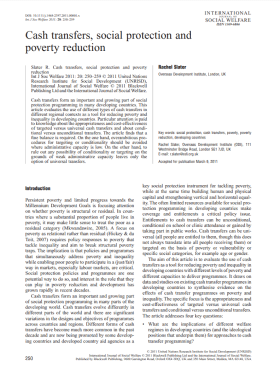
Cash Transfers, Social Protection and Poverty Reduction
Policy paper
Cash transfers form an important and growing part of social protection programming in many developing countries. This article evaluates the use of different types of cash transfers in different regional contexts as a tool for reducing poverty and inequality in developing countries. Particular attention is...
